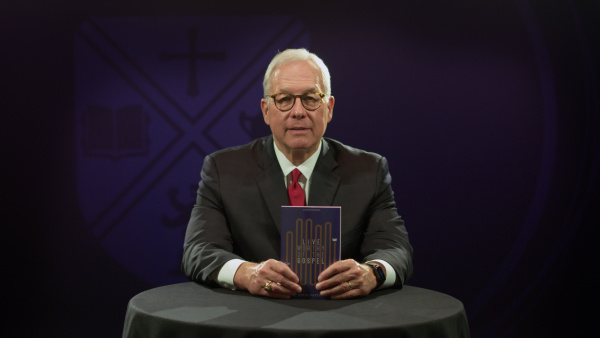PHILIPPIANS 2:17–18
Yea, and if I be offered upon the sacrifice and service of your faith, I joy, and rejoice with you all. For the same cause also do ye joy, and rejoice with me.
Have you ever known a Christian who maintained a joyful spirit in the face of difficult circumstances? Perhaps this was someone who encouraged fellow believers who were struggling in spite of his own diagnosis of terminal cancer. Maybe it was a widow who ministered to grieving family members and friends in the midst of her own sorrow. God gives grace so that His people can rejoice even when assaulted by trials at every turn because we know God is maturing us (James 1:2–4) and that He orchestrates everything for our good and His Son’s glory (Rom. 8:29–29).
One of the most striking accounts of joy in all Scripture is Paul and Silas praying to and praising God in the deep recesses of the Philippian jail (Acts 16:25). Luke’s account of this prison praise service provides a window into the apostle’s mindset of finding joy in God while sacrificing to proclaim His Gospel. Paul concludes the passage we have been studying with a manifestation of his sacrificial love for the Philippians and a demonstration of the pathway to true joy.
An Apostolic Pattern of Joy
Throughout Philippians, we see Paul as the Christlike model of joyful Christian maturity. He projects his personal joy as a motive for their obedience: “Fulfil ye my joy” (Phil. 2:2) and “Rejoice with me” (2:18). This is not a selfish plea but a paradigm of true joy. Sixteen times in this letter Paul addresses the lofty subject of the believer’s joy. This sublime quality was the driving desire of the apostle’s life. Spiritual joy finds its source in the Lord and its substance in the Gospel — His saving work in the lives of people. That’s why Paul’s joy was deeply affected by the Philippians’ response to this epistle as they lived worthy of the Gospel and progressed in their spiritual maturity.
Let’s survey the passages in Philippians that mention joy.
Joy Passages in Philippians
(emphasis added)
- Always in every prayer of mine for you all making request with joy. (1:4)
- What then? Notwithstanding, every way, whether in pretence, or in truth, Christ is preached; and I therein do rejoice, yea, and will rejoice. (1:18)
- And having this confidence, I know that I shall abide and continue with you all for your furtherance and joy of faith. (1:25)
- That your rejoicing may be more abundant in Jesus Christ for me by my coming to you again. (1:26)
- Fulfil ye my joy, that ye be likeminded, having the same love, being of one accord, of one mind. (2:2)
- Yea, and if I be offered upon the sacrifice and service of your faith, I joy, and rejoice with you all. (2:17)
- For the same cause also do ye joy, and rejoice with me. (2:18)
- I sent him therefore the more carefully, that, when ye see him again, ye may rejoice, and that I may be the less sorrowful. (2:28)
- Receive him therefore in the Lord with all gladness; and hold such in reputation. (2:29)
- Finally, my brethren, rejoice in the Lord. To write the same things to you, to me indeed is not grievous, but for you it is safe. (3:1)
- Therefore, my brethren dearly beloved and longed for, my joy and crown, so stand fast in the Lord, my dearly beloved. (4:1)
- Rejoice in the Lord always: and again I say, Rejoice. (4:4)
Joy is an act of faith and surrender to God. We choose to turn from the temporary lusts and pleasures of this world and to look to the Lord alone as our chief Source of delight. The natural, unredeemed person has no capacity to see the invisible, spiritual world of faith. Only believers can see the unseen! That’s what faith is (Heb. 11:1). We have a new heart that was implanted by the sovereign work of the Holy Spirit. The result is a new love for God poured into our souls. Delight in God is the fruit of regeneration. Through diligent study of Scripture, the Spirit of God progressively transforms our minds, and our delight in God increases.
A Mutually Sacrificial Offering
PHILIPPIANS 2:17
Yea, and if I be offered upon the sacrifice and service of your faith, I joy, and rejoice with you all.
WORD STUDY
Offered — to be poured out as a drink offering
Sacrifice — an act of offering
Service — ceremonial duty; ministry
Rejoice — to rejoice together with; take part in another’s joy
With spiritual joy in mind, Paul was willing to make whatever sacrifice was necessary for the benefit and blessing of the church. He describes his life metaphorically as a sacrifice offered in the temple during the service of the priesthood. Part of this ritual involved the pouring of a drink offering over a burnt offering that was being consumed by the altar’s fire. Paul visualized the faith of the Philippians as an ancient sacrifice during the ritual service of the priesthood. Like every other church, they were not perfect. He expresses concern about disunity in their midst and the false teaching that could corrupt their Christianity as it has in so many congregations. He also admonished them not to be anxious. However, Paul unreservedly commends the Philippians as faithful believers. In fact, one of his reasons for joy was their “fellowship in the gospel from the first day until now” (1:5).
In particular, this church had faithfully supported Paul ever since the Lord miraculously established a congregation in this pagan Roman colony. Now, with the gift that prompted Paul’s letter, the Philippian church had raised their support to a new level. It was no small act of loving sacrifice to send Epaphroditus 800 miles to “supply (the Philippians’) lack of service toward (Paul)” (2:30). This “lack of service” initially sounds like they were lackluster in their ministry to Paul. What he means, however, is that the missing element of their ministry was not having a recent opportunity to support Paul in person, a void admirably filled by Epaphroditus. Paul extols this messenger for living worthy of the Gospel: “Because for the work of Christ he was nigh unto death, not regarding his life” (2:30). His journey of faith, compelled by his church’s concern for Paul, was “a sacrifice acceptable, wellpleasing to God” (4:18). The Philippians were doing what Paul commands in Romans: “present your bodies a living sacrifice, holy, acceptable unto God, which is your reasonable service” (Rom. 12:1).
Like a burnt offering, the Philippians had rendered “the sacrifice and service of (their) faith” (Phil. 2:17). Paul viewed his life like a drink offering being poured onto the Philippians’ faith. He willingly and joyfully gave his life, even in death, for the benefit of the believers’ faith. Though the verb translated “be offered” does not denote “being killed,” it can refer to a martyr’s death. (See 2 Timothy 4:6.) This seems to be Paul’s meaning, even though he does not mean a martyr’s death is inevitable or immediate. There is strong evidence in this letter that Paul thought he would be set free. Nevertheless, he had spent his life for the sake of the Gospel and, therefore, for the sake of God’s people. Eventually, this way of life would mean death. But what price is too high to pay for a Savior who submitted Himself to death on a cross? Why wouldn’t Paul pour out his life to declare the good news of a Savior who emptied Himself to become a servant (Phil. 2:7)?
As he joyfully chose to make this sacrifice, Paul urges the Philippians to rejoice in like manner for the same purpose. His repetition of joy and rejoice in verses 17 and 18 emphasizes the importance of joy as well as his union with the Philippians. As we involve our lives in God’s purpose and work in the world, we soon find fresh, new joy in serving others and in advancing the Gospel. There is joy in serving Jesus! Paul’s sacrificial life became the supreme model of joy for the whole church, and he urged all believers to choose the same lifestyle.
This post is from Live Worthy of the Gospel: A Study in Philippians by Steve Pettit. Copyright 2016 by BJU Press. Printed by permission of BJU Press.
This post is part of the study designed to correspond with the 2020 Fall Chapel Series. Watch the chapel message below:
Join us for chapel via live webcast at 11 a.m. every Monday and Wednesday.








